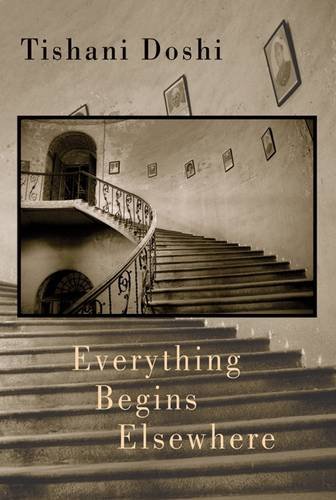Georgia Carys Williams casts a critical eye over the latest release from Bloodaxe Books, Everything Begins Elsewhere, a poetry collection from Tishani Doshi.
Poet, dancer, writer and traveller Tishani Doshi’s latest poetry collection since her Forward Prize-winning debut Countries of the Body, in its very title, Everything Begins Elsewhere, borrowed from John Burnside’s memoir, promises us passion and exploration. Page by page, we find an award-winning poet disguising the self-discipline of her craft so effectively that just as with dance, the result is an appearance of beautiful simplicity.
The title implies that the voices within will be searching not for something, but for ‘everything’, which in turn implies two concerns: what is missing and what is to be discovered. ‘What is elsewhere?’ we ask, already aware that it is a place other than home. However, it is not simply foreign lands in conventional terms, but everything we cannot see or physically reach towards; every place to which the mind restlessly strays. This book is therefore appropriately divided into two sections; ‘Everything Begins’ being the title of the first; a division itself illuminating the collection’s emphasis on time, space and its inevitable overlapping. Travel is greatly significant throughout, as well as the distance between countries and a person’s longing for one place whilst residing in another, which is most clearly portrayed in ‘The Adulterous Citizen’.
Opening the collection, ‘Dog in the Valley’ acknowledges the many universal themes of life that never disintegrate, such as love, which replays itself over time like ‘a music that goes on and on’; a tragedy ‘from a long / time ago’. The stunted lines here are a characteristic trait of Tishani Doshi’s and we read them as though they are spoken in our heads with a slow passion, perhaps even by the tender but definite voice of the eloquent poet herself. In ‘Ode to Drowning’, we are told:
It’s that old idea
of drowning
in another to find the self
as though there is a masochistic indulgence:
It’s desire after all
that spins us
Demands to be praised
a pain to be slowly played out.
Similarly, in ‘Falling, 1968’, we are told how ‘falling / in love is something like dying after all.’
This collection clearly follows the thread of a theme it is unafraid to use the term for; love, but it does not use it lightly, either. As with each poem, each word is chosen carefully; never for mere sound but always fitting comfortably into sometimes grandiose metaphor. ‘Ode to the Walking Woman’ is an example:
and love.
And ancestors
who move
like silent tributaries
from red-earthed villages
with history cradled
in their mythical arms.
Similarly, ‘Love Poem’, with a title somewhat trite, is one of the most endearing in the collection. Its fearful honesty and perceptive telling are so easy to relate to that the writing is often forgotten as we hear it speaking to us, just as we forget the hours of a dancer’s training when we watch him or her perform. This is love, tragically pre-determined to end, with the sad refrain:
we will lose each other to something.
Separation is a recurring theme too, which explains the perpetual searching; the desperate yearning:
Between this moment and the next
there’s always space for a lover’s return.
In this poem, ‘Sunday Afternoon’, we are most clearly presented with the passive, vulnerable voice that looms over each text. Love seems to be the base for which a lot of themes in the collection are compared:
on the monastery floor, guide your fingers to the door-
ways of my shattered heart, so you can feel it too –
the ocean that travels with me; how it gathers and breaks,
gathers and breaks; like love, how it stills, then parts.
This, from ‘Lesson 2: Learning Mudras in Bhutan’, is a more imagistic example. In the second half of the collection, ‘Elsewhere’, we are introduced to iconic aspects of modern society such as ‘sun-bleached hair and hollowed chests’, or ‘flat-screen TVs’ and, in the poet’s bleak epiphany of this newly landscaped reality, even given specific brand names such as Fischer-Price in ‘Fischer-Price Men’. Here, the toy figures are used as objects at the centre of past and present, followed by the heartbreaking lines about a mentally-tormented sibling, which reminds us of the inevitable transmutation of all beings:

by Tishani Doshi
72 pages, Bloodaxe, £8.95
He is in a place of no time,
with no thoughts of death or fear.
Only the sound
of his beating heart,
which must tell him
that he is human,
that he too is moving somewhere
A wonderfully feminist poem, ‘That Woman’, (one of several in the collection) perhaps unconsciously revives yet another text from history; Anne Sexton’s ‘Her Kind’. Both refer to women of different roles in society who are held in disrepute, yet secretly understood:
But that woman and I
have been moving together
for years
Furthermore in Everything Begins Elsewhere, Tishani Doshi writes, which is an allusion to our plural selves; the fact we are plural women, never as distant from one another as we might think and often slipping into invented stereotypes.
Moreover, in ‘Lesson 4: Zero, or Infinity’, we are given what could be seen as a self-referential template for the entire collection:
There’s a place that poets seek
as real and fearsome as the body.
When I find this place
I will lie down in it,
and it will be like lying
in the stomach of Time –
the dark, pock-marked endlessness of it.
This is a book you will cleave to; by the end, so enlightened that you may feel inclined to read it all over again – a result of its enchanting imagery. The title may be borrowed from another time and place, but Tishani Doshi acknowledges this, placing past alongside the construct of today’s grim realism; the reason for perpetual searching after all. Once we have escaped the dance of the words on the page and are ‘resurrected into this uncertain world’ again, we are left to question, what will become of us once we have returned; now more conscious of the wavering world around us, now more conscious of ‘elsewhere’?
Recommended for you…
Ahead of the release of Everything Begins Elsewhere, poet Tishani Doshi chats to Wales Arts Review’s Carl Griffin about her craft and inspirations.
Header Photo Courtesy of Carlo Pizzati.



 Enjoyed this article? Support our writers directly by buying them a coffee and clicking this link.
Enjoyed this article? Support our writers directly by buying them a coffee and clicking this link.







